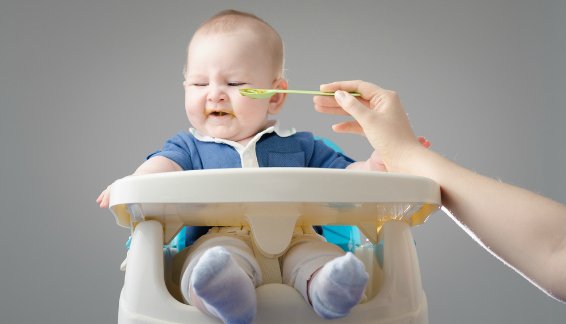Is your baby batting the spoon away? Does she close her mouth tightly as the spoon comes closer? It may be time to rethink the way you are feeding her.
When Baby Refuses to Eat from a Spoon – Why your baby won’t eat from a spoon and what you can do to make mealtimes relaxed & fun.
Suddenly, your baby has refused to eat when you try to spoon feed her. She may refuse to eat from the spoon in a variety of ways, expressing her displeasure in ways that may be upsetting to parents. Relax Mom & Dad, your little baby is growing up and refusing to eat from a spoon is just part his natural progression to feeding himself. When baby refuses to be spoon fed – it’s actually a milestone! Bring on the Finger Foods – this might just get your baby excited about eating and make the transition from the spoon stress-free.
When Will My Baby Refuse to be Spoon Fed? 
There is a period between 8 and 10 months of age (may be earlier), that your baby may begin to refuse being fed food from a spoon. It is around this age range that babies really begin to become more aware of themselves and what they want and asserting independence by refusing to be spoon fed is just another milestone.
Why is My Baby Refusing to be Spoon Fed?
As mentioned, babies begin to find their own independence in a variety of ways. They may show favoritism for a certain toy or lovie and become insulted when you offer them a toy that is not the “toy du jour”. Being able to assert their own preferences for eating is another way for babies to head off down independence lane. They may try to grab the spoon away from you or bat at the spoon as it comes close to their mouths. Many babies will simply clamp their lips shut and refuse to open up for a bite. These behaviors are perfectly normal and going with baby’s flow will help create positive food relationships and experiences.
![]() Please note that many babies will also refuse to be spoon fed if they are feeling ill or if they are teething. Tiredness may also affect baby’s eating habits.
Please note that many babies will also refuse to be spoon fed if they are feeling ill or if they are teething. Tiredness may also affect baby’s eating habits.
What Do I Do When My Baby Refuses to be Spoon Fed?
Take a few deep breaths and relax.
We have found that when our babies reach this new milestone, offering them a bowl and a spoon is one of the simplest ways of appeasing and encouraging them. We mix up their meals as usual and let them try to feed themselves. You could also experiment with a Baby Led Weaning method – simply offer baby’s meals in finger food form.
Oh yes indeed, this is quite messy and you’ll be cringing as food flows down the highchair and over those plump, cute little baby legs; the food will make it’s way through baby’s hair and probably into the ears too. And just when you think your baby will never manage to find her mouth – Success. Sit back and watch your baby delight in her newfound sense of independence and accomplishment.
When Should I Stop Feeding My Baby With A Spoon?
Only you will know when your baby is ready to stop being spoon fed. All babies are different and will refuse the spoon at different ages and stages. There are many babies who have never been spoon fed. Baby Led Weaning is an approach to infant feeding that is catching on around the world. Babies who are fed via this method never eat “traditional” baby food purees. Instead, babies are offered age appropriate foods that are soft cooked and mashed or smooshed or diced very small. The foods are offered to baby and baby eats the foods as he or she sees fit.
Read our Baby Led Weaning article to learn more.
Offer More Self-Feeding Meals
You may begin to offer your baby more meals made up of foods that baby is able to feed herself whenever you feel she is ready. Don’t worry too much about the amount she eats. Offering a variety of nutritious foods during the day will ensure that your baby is getting all the nourishment she need. Remember, breast milk and/or formula remain important sources of nutrition until baby is 12 months of age.
![]() Remember, always consult with your pediatrician regarding introducing solid foods to your baby and specifically discuss any foods that may pose allergy risks for your baby.
Remember, always consult with your pediatrician regarding introducing solid foods to your baby and specifically discuss any foods that may pose allergy risks for your baby.
![]() This site complies with the HONcode standard for trustworthy health information: verify here.
This site complies with the HONcode standard for trustworthy health information: verify here.


